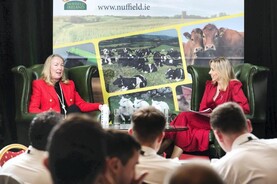The challenges faced by the farming sector could be more manageable if appropriate regulations were put in place to facilitate the use of new genomic techniques such as gene editing, Dr Barbara Doyle Prestwich of UCC told attendees at the Goldcrop open day last week..
However, at present gene editing is classified under the same rules as genetic modification (GM) and so is not allowed in the EU.
GM involves the insertion of a gene into a plant, while gene editing does not bring new genes to a plant it uses enzymes to snip genes and speed up the breeding process.
Doyle Prestwich said that gene editing technology can help to reduce inputs, improve food safety, producer handling, help to grow crops in a challenging climate, increase crop yields and profits.
Food sovereignty
“It’s not a silver bullet. However, without it I feel we in Ireland and Europe are trying to compete with people in many different countries where this has been proportionately regulated. We’re going in with one hand tied behind our back."
“We don’t want to grow it here [GM crops] it seems, but we’re importing that [GM crops] from South America. So, it doesn’t make sense to me that we accept the technology when it’s grown in other countries, but we can consume it here. We won’t stand over our own food sovereignty.”
GM maize and soybeans are imported into Ireland for animal feed.
The professor was quick to point out that gene editing is very different to GM, that it is affordable and echoed a voice from the audience that it will allow for the democratisation of this technology.






 This is a subscriber-only article
This is a subscriber-only article










SHARING OPTIONS: